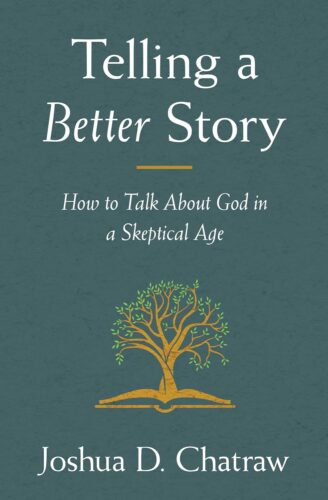Engaging Others with Christ
Author: Joshua D. Chatraw
In the western world today, the old-time apologetics just don’t fit anymore. Society does not share the same baseline assumptions, and so a rote repetition (or “dump truck” load) of facts, names, dates, places, and historical evidence leave most secular audiences glazed over, their questions unanswered and their imaginations unengaged. Winning souls is not about following a tract or 12 step program. It’s about engaging the imagination, listening, and understanding the underlying questions of our time. It’s about conversation. It’s about a story.
In Telling A Better Story: How to Talk About God in a Skeptical Age author Joshua D. Chatraw notes how our society values a story and imagination, even in the face of supposedly harsh reality. While we claim a love of science and that the “facts are just the facts”, our movies, our books, our favorite tales, are literarily out of this world, confronting good and evil, lauding sacrificial heroes, championing the underdog (the exact reverse of the practicality of “survival of the fittest”). We love engaging in the otherworldly and supernatural. The more practical we claim to be as a society, the more our meta-narratives give us a way. We long for something. And that’s how the conversation starts, Chatraw argues. We engage people by actively listening to their stories and following the stories that engage them.
This is where Chatraw proposes his “inside/outside” approach. First, go inside. What is your interlocuter’s story? Where can you affirm their story? Where do you need to challenge it. People ultimately value morality, even if they cannot articulate what it is and where it comes from. Where do you see them honoring this? Where do you see their activism to make the world a better place, to take care of their fellow humans? Where does their story lead, if they really follow what they say they believe? Is their worldview consistent? Is it livable?
Once you’ve engaged with them on the inside, it’s time to look at the outside. Even though we are a post-Christian society, many of the morals and ethics that linger come from Christianity. Where does their story, their world view, borrow from Christianity? Where does Christianity better address their experiences, observations, and history? How is God’s way ultimately more livable, and where does it address and make sense of the person’s innate longings to be good and do good?

Image by Amore Seymour from Pixabay
As we get further into the book, Chatraw keeps the inside/outside examination going as he starts to deconstruct the unique objections to Christianity of our time. Most of world history and most cultures in the world until this point espoused some form of religion, either monotheistic or polytheistic. The fact that western society today is largely based on atheism is a unique time in the world, and this comes with its own targeted statements:
- I don’t need God or religion.
- You have to be true to yourself.
- The ultimate goal of life is happiness.
- It’s okay to be spiritual, but don’t say that your religion is the only way.
- We’ve progressed beyond the panacea of faith and myths to reason and science.
Chatraw spends time with each one of these statements, disassembling them with the inside/outside motif and addressing how secular explanations cannot make sense of the problem of evil or suffering. While going through the statements, Chatraw advocates honesty and a realistic approach, instead of attempting to explain everything in one oversimplified glut of information. He admits that there is no “knockout argument” and just as secularists cannot point out evil under a microscope, we cannot point out God that way either. Both views demand a leap of faith, and there are some questions we can never ultimately answer to our own satisfaction. That’s where story comes into play. Which worldview, which narrative, answers more of our questions, proves more consistent, proves more livable. That is where the better story in the title comes into play.

Image by Alana Jordan from Pixabay
At the conclusion of the book, Chatraw goes somewhat into more standard apologetics. While these no longer fit the bill as the out-of-the-gate approach, we still do need to be able to answer the harder questions and give stolid reasons for our beliefs, including all the usual (historical evidence, etc.). In this section, Chatraw deconstructs the popular modern myths that Christianity is oppressive, unloving, and untrue. These are large sections, and in them Chatraw is first to note that the history of Christianity, like all human history, is marred with horrors (the crusades, slavery, etc.). He deals with honest responses, flagrant historical disobedience to God’s will, but also sheds light on how modern accusations have misinterpreted scriptures and positive Christan moments of history (Christians established science and hospitals, for example.)
And, one last final comment before I close this lengthy review – the extensive footnotes in this book make my heart sing. So many different resources to dig more deeply into every possible aspect! I’ll most certainly use these footnotes as a springboard for further studies.
Telling a Better Story is the best apologetics book (outside Lewis’ works, of course) that I have ever read. It’s engaging, clearly written, honest, and looks at issues that we see on our social feeds and TVs every single day. The optimism in it is refreshing – no more of this doom and gloom about the times we are living in! Chatraw examines our unique advantages and disadvantages now, while also giving us a quick historical rundown about modernism, post modernism, and everything in between. The work is grounded, biblically based, compelling, and clear. I’ll want to read this again, to memorize this engaging way of discourse that Chatraw has and his appreciation of narrative and story and real people living real lives with real questions. Unequivocally recommended.
– Frances Carden
Follow my reviews on Twitter at: https://twitter.com/xombie_mistress
Follow my reviews on Facebook at: https://www.facebook.com/FrancesReviews
- Book Vs Movie: The Shining - April 6, 2020
- Thankful For Great Cozy Mysteries - December 13, 2019
- Cozy Mysteries for a Perfect Fall - October 20, 2019


